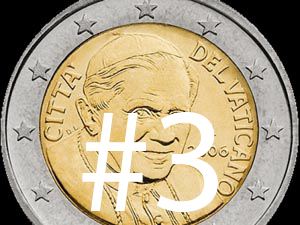Two books released this week chronicle the financial corruption rampant at the Vatican. These stories are making headlines for two reasons.
- The Vatican has been operating a kind of black market retail operation, yes, employee of the church can buy goods, like cigarettes and food at whole sale prices at special shops, but it turns out those shops have been selling to lots of other people… these new reports also tell a story of lux living for the papal entourage, including helicopter charters paid for out of funds for sick children. We have a wrap up on the coverage, and were surprised to see some Boston-based reporting that seemed to justify the Church’s indiscretions is a way that totally cheeped us out.
- The other story is that even the Pope can’t keep a lid on his secrets, leaks are commonplace in all big organizations, the Church is no exception.
One of the authors claims the Holy See’s real-estate holdings, not including church properties such as cathedrals, are worth at least €4 billion ($4.4 billion). He also says a fund for the care of sick children paid €200,000 towards the conversion of a cardinal’s penthouse apartment and €23,800 to charter a helicopter for him.
Other disclosures bear on the Vatican’s relationship with Italy. According to a leaked auditors’ report, the Vatican earns €60m a year selling petrol, cigarettes and other products at below-market prices in Italy. They should be available only to the city-state’s citizens, yet more than 40,000 Italians are said to have cards giving them access to the shops beyond the Vatican’s walls. One of the books reports a request from Italian prosecutors for information on a named individual suspected of hiding taxable assets in the Vatican bank. (Vatican officials insist all accounts opened without good reason by lay Italians are now blocked.)
While the city-state can be a thorn in the side of Italy and its capital, it can also be a blessing, both spiritually and fiscally. Every 25 years, by tradition, the Vatican declares a holy year, or “jubilee”, which attracts millions of pilgrims and pours money into Roman coffers. Popes can also declare jubilees in intervening years, as Francis has done. This extraordinary jubilee is due to start on December 8th.
Yet even this windfall can become a burden. Francis’s announcement of the jubilee took Rome’s government by surprise. The city administration is already plagued by corruption and deficient public services; with just a month to go, it is woefully unprepared for a deluge of new tourists. On October 30th, more than half the city’s councillors resigned to oust the mayor, Ignazio Marino, who was accused of (and denies) fiddling his expenses. He has been replaced by a government-appointed commissioner. The central theme of all jubilees is pardon. Quite a lot may be needed in the Vatican, as in Italy, in the months ahead.
The Boston Globe’s Publication: CruxNow, offered the below summary of the new tell-all books, stating: “they seem likely to elicit pro forma professions of shock over things which, for the most part, everyone already knew.” Crux, seems to completely miss the juicy details, about how the money for the lux living is coming from funds designated for sick children. And, how the wholesale commissaries offering deep discounts exclusively for Papal residents and employees (much like on a military base), were illegally accessed by thousands of outsiders, essentially creating a black market for goods, run by the Vatican…
Here’s Crux’s summary of the books:
For instance, Gianluigi Nuzzi’s book “Via Crucis” (in English, “Merchants in the Temple”) describes how cardinals live in elegant and spacious quarters, often at zero cost, and that in general Vatican-owned apartments often bring in substantially below-market rents because residents have been cut sweetheart deals.
Meanwhile, Emiliano Fittipaldi’s book “Avarizia” details how commercial operations inside the Vatican walls – a gas station, pharmacy, tobacco shop, and supermarket – generate tens of millions of euro in income by selling products at discounted prices due to tax exemptions.
John L. Allen, the reporter for Crux, goes on to say:
“When my wife and I lived in the city full-time during the late 1990s and 2000s, for instance, she had a friend who worked in a Vatican office who would occasionally lend her an employee card to get into the supermarket. My wife would report afterwards that she wasn’t sure any of her fellow shoppers actually worked in the Vatican, since they mostly seemed to be people like her.”
We understand what it means when someone normalizes criminal activity. Ironically, the Spotlight Team, also a part of The Boston Globe, blew the cover on another criminal ring run by the Church, which had also been normalized it’s offenses: Sexually assaulting children. I’m not sure the “everyone’s doing it” justification should ever be applied to an institution established to define the moral code. It certainly feels yucky here, coming from a journalist reporting the news…
Allen continues to claim there’s nothing “new” learned from these books. “There may be few genuine bombshells, but the leaks themselves are real,” Allen writes. He writes that Papal Secrecy, a part of Vatican law, used to mean complete confidentiality and total control over every decision the Pope made, with these tell-all we now see that the Pope does not have control over the dissemination of information. It feels a bit like Allen is trying to change spin the story… His “blame the messenger” not the actual corruption inside the Vatican is fowl. It also feels contradictory. If there’s “nothing new” leaked or revealed in these books, then how can the concept of a leak be novel?
““Pontifical secrecy” is a well-defined concept in Church law applying to several categories of information, such as materials related to the naming of bishops and reports from papal diplomats. More broadly, however, it evokes the assumption that all communication with the pope is confidential, and it’s always up to him, and him alone, to decide whether to make any of it public.”
Allen then goes on to document how leaks have always happened, but says the media landscape and interest in Francis has increased consumption. In another story on Crux “Why There’s Still A Case for Hope on Vatican Financial Reform,” it’s more of the same. The first three grafs discuss this “embarrassment” the Vatican faces on the leaks… buried way down, he finally gets to this:
“We learn that having someone declared a saint can cost hundreds of thousands of dollars, and that “postulators,” officials who manage sainthood cases, sometimes command impressive fees to speed things up – raising the suspicion that, in some cases, halos are being bought rather than earned.
Nuzzi also reveals that “Peter’s Pence,” a collection from ordinary Catholics around the world and often billed as support for papal charities, functions as a way to offset Vatican deficits. For every dollar taken in, Nuzzi asserts, barely 20 cents go to help the poor.”
We have a backgrounder on the Church’s Banking system, reported last year when the Church released it’s first financial statement in more than a century.






